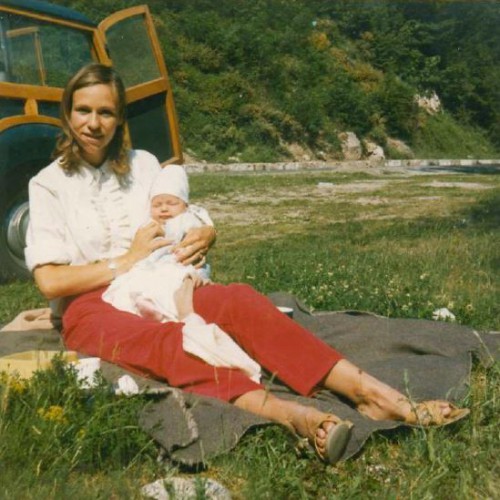10th April 2014 Sofia, Bulgaria
To Food with Love
by Jane Burner
Jane Burner lived in Bulgaria between 1970-1972 and 1984-1987 – during the two postings of her husband Alan Burner to Bulgaria as 3rd Secretary and Deputy Head of Mission respectively.
“The old stories about joining a queue to see what was at the end of it are all true!” – Jane Burner

“What are we queuing for?”
Food, and finding it, took up a lot of time. There were no supermarkets and shops were scarce and mostly empty or the shelves were groaning with pickled vegetables. Milk was delivered to the shops early every morning and stored in the window in the full glare of the sun in a plastic bag, so as to have gone gently off by the time Maria or I had got there. When something did arrive in the shops, the queues snaked down the road and round the corner. The old stories about joining a queue to see what was at the end of it are all true!
The real shopping was done in the markets. Scattered round Sofia, tucked away in the aback street, redolent of rotting vegetation and bad drains. It was considered perfectly normal behaviour to stop someone in the street, without looking or speaking to them, and just peer into their shopping basket to see what they had and then ask at which market they had just been to. It happened all the time and I got used to it.
I loved the markets – they had a very distinctive smell, feral cats slinked between stalls, which were manned by crones in deepest black. They sold whatever their little gardens or allotments had yielded and in winter there was literally nothing, not even bundles of turnips and carrots.
This was when we would take a trip to Greece and fill a Land Rover with fresh food for the entire embassy, spend the night and come back. Alan and I often volunteered for this, as it meant a night away and a meal in Greece. It was extremely hard work as all the Embassy staff gave us their shopping lists and money in sterling, dollars, leva or drachma. It all had to be sorted out and in a bustling, hectic, cacophonous Greek market it was easy to panic.
Eventually we found a Greek saint. A market man to whom we could hand over all the money, all the lists, go and have a drink, come back to find everything bagged up and the change in envelopes. It was like a dream come true. The Bulgarians themselves existed on bottled and pickled food in the winter but it was hard and monotonous for them and although easier for us, it was still drear. Hence our obsession with sausages.
Were we radio active or were we not?
We were on the second of our two Bulgarian postings when the Chernobyl disaster happened. Suddenly the markets were flooded with strawberries, and untold luxury. These came from possibly contaminated soil and therefore unfit for export; the local population could eat them and take their chances or let this treat pass them by. We ate them.
Our Embassy had been asked by London to obtain a sample of turf with plenty of soil attached to send back for testing. We went up Mount Vitosha with a spade and diplomatic bag late one night and dug up a good sized lump of Bulgaria without attracting too much attention. I never did find out if we were radio active or not.
Don’t forget the horrid butchers shops and the flies of course!